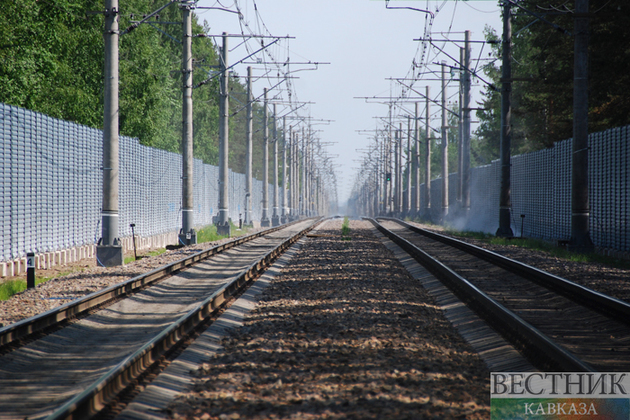The governments of Pakistan, Turkey and Iran seized a historic opportunity to revive a transnational, transcontinental railway service strategically connecting Istanbul, Tehran and Islamabad, unleashing profound economic prospects as developing nations strive to economically rebound amid alarming inflation, devalued currencies and hauntingly crippling waves of the coronavirus pandemic, Daily Sabah writes.
On Dec. 21, 2021, the Turkish manufactured Islamabad-Tehran-Istanbul (ITI) freight train commenced its journey from Islamabad's railway station in sector I-9 of the capital en route to its premier destination in Zahedan, Iran, from where the Turkish train will pick up goods and head toward Istanbul.
The ITI rail inauguration was attended by several dignitaries, including Pakistani Railway Minister Azam Khan Swati, and Amjad Ali Khan, director-general of the ITI train project, as well as Pakistani Foreign Minister Shah Mehmood Qureshi and commercial advisor Razak Dawood. The ambassadors of Turkey, Iran, Kazakhstan and Uzbekistan inaugurated the cargo train's flagging off ceremony.
The ITI is a revolutionary first step vis-a-vis regional Eurasian trade connectivity. It is a ground-breaking generational “geo-economic” opportunity for Pakistan, Turkey and Iran, who will benefit from the potential trade and infrastructure diplomacy of the new railway. Turkey, Pakistan and Iran's importers and exporters can fully leverage this commercial opportunity at a time highly influenced by strategic “geo-economics.”
Geostrategically for Turkey, the long-anticipated ITI transnational railroad bolsters connectivity with China's game-changing Belt and Road Initiative (BRI) by offering rail connection between China and Turkey whereby the country's businesses will gain unparalleled access to China's consumer market of 1.402 billion people and Pakistan's promising market of 220.9 million consumers, helping to economically turnaround Turkey in a post-COVID-19 era.
This modern “orient express” links Western and Central Asia to China through its flagship BRI. Also linking the BRI to seamlessly connect China and Europe, the ITI railway is crucial for Beijing given China's whopping investments in Pakistan via the China-Pakistan-Economic Corridor and Iran through the Shanghai Cooperation Organization (SCO). With the free trade agreement (FTA) between China and Pakistan, other beneficiary countries could also conduct direct exports to China tax-free, according to a report published by Daily Sabah.
Opportunities for all
ITI's revolutionary rail connectivity offers unprecedented opportunities for struggling nations like Afghanistan, where regional trade is vital to bring the volatile state back from the brink of economic collapse, social unrest and a looming humanitarian crisis. The ITI network also benefits the energy and mineral-rich Central Asian Republics (CARs) like Azerbaijan, Uzbekistan, Kazakhstan, Kyrgyzstan, Tajikistan, Turkmenistan and China.
Analysts forecast that the ITI could boost Pakistan's foreign trade volume, which is currently around $65 billion (TL 577.34 billion). The ITI empowers Pakistan's business community with the potential to earn $32 million annually with the possibility to increase it to $64 million if the ITI network is linked to additional railway stations in Lahore, Faisalabad (a business and textile hub), Sialkot (a sporting goods and apparel production center), Karachi (the main commercial hub) and Rohri (known for rice, sugarcane wheat and cotton) to transport goods to Turkey, a country that remains a pivotal gateway to Europe and Central Asia from Pakistan.
Ahmet Cengiz Özdemir, chairperson of the Foreign Economic Relations Board (DEIK), a vital promoter of business diplomacy and the Turkey-Pakistan Business Council, stated that the train line regionally integrates Pakistan, Turkey, China, Iran and the Central Asian republics with Europe. The ITI network must be extended beyond Istanbul. All these nations can reap dividends from the railway, which can further be integrated with air and strategic waterways with the sea lines of communication (SLOC).
Passengers can also eventually benefit as commercial train tickets are less costly compared to airline fares, boosting tourism and travel to all the concerned countries as well as supporting the tourism sector battered by the pandemic. The revolutionary ITI cargo train service is a highly cost-effective mechanism for regional connectivity during times of economic meltdown.
Turkey's ambassador to Islamabad, Mustafa Yurdakul, hoped that the ITI would not stop at Istanbul but rather travel all the way to Europe to fully benefit all regional economies in the post-COVID-19 era, a sentiment echoed by Ahmet Şahin, Turkey's commercial counselor in Islamabad. Turkey's transport and infrastructure minister, Adil Karaismailoğlu, also echoed the positive sentiments regarding the project.
The ITI railway corridor significantly reduces time and cost compared to sea freight because trains are the most competitive mode of transportation. The ITI rail network is the shortest and most affordable route for the transportation of goods between Asia and Europe, benefiting regional economies. The train bears a maximum capacity of 20 12-meter (40-foot) containers with a capacity to carry 80,000 tons of products, according to logistics experts. The train service significantly lowers the cost of transit of products from Pakistan to Turkey, which normally takes a minimum of 30 days via sea routes. The ITI train reduces shipment duration by seven days but also diversifies the portfolios of Pakistani, Turkish and Iranian products entering Europe by strongly integrating them into the global economy.
The ITI rail network will take 12 days to complete a one-way trip of approximately 60,640 kilometers (37,680 miles). Whereas 1,825 kilometers of the railroad are in Turkey, 2,600 kilometers are in Iran and 1,970 kilometers are across Pakistan. "The initial cargo train from Islamabad included 13 containers transporting dates, rice and pink salt," according to veteran Islamabad correspondent Sana Jamal. Qureshi said that the rail corridor “will play an important role in regional connectivity and will bolster economic activity in the region.” He expressed his hope that the forthcoming passenger trains will also commence on the same route subsequent to the seamless running of the freight train.
The ITI's inception was in 2009 under the auspices of the Economic Cooperation Organization (ECO) but was suspended in 2011 and delayed in Pakistan owing to technical glitches. In 2020, at the 10th meeting of the ECO, participants decided to relaunch the railway in 2021, which now heralds a new economically integrated dawn for coming generations.






